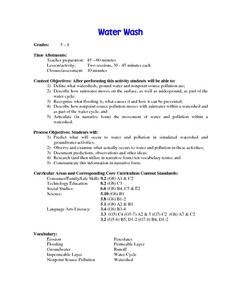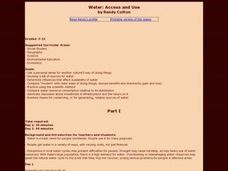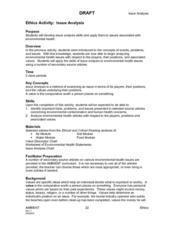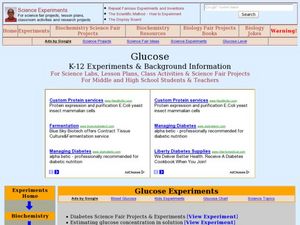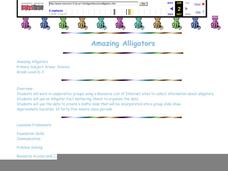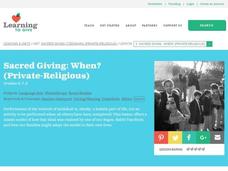Curated OER
Trophic Ecology of Humans
students analyze the place of humans among the tropic levels by observing what we eat. They calculate the caloric content of several foods commonly eaten by humans and calculate the total energy cost to grow, process, transport, store...
Curated OER
Trophic Ecology of Humans
Students analyze the trophic level of humans by first calculating the kilocalories in own their lunch. They then calulate the kilocalories in a wide variety of foods found in grocery stores and compare the kilocalories needed to acquire...
Curated OER
Water Wash
Students define watersheds, ground water and nonpoint source pollution. They describe how rainwater moves on the surface, as well as underground, as part of the water cycle. They recognize what flooding is as well as its causes.
Curated OER
TE Lesson: What to Wear? What to Drink? Weather Patterns and Climatic Regions
Young scholars examine how climate affects lifestyle, clothing choices, food, and water sources. They explore climatic regions such as tropical, desert, coastal, and alpine situations. They look at the longitude and latitude, land...
Curated OER
Water: Access and Use
Students get a personal sense for another culture's way of doing things. Develop a list of sources for water. Practice using the scientific method. Examine means for conserving, or for generating, reliable sources of water.
Curated OER
Our Dependence on Fossil Fuels
Learners become aware of their dependence on fossil fuels. As an introduction activity not all students are treated equitably to emphasize that fossil fuels are finite resources. They are asked to list the external sources of energy used...
Curated OER
Can You See the Light?
Students investigate the transmission of light energy. For this light energy lesson, students observe bubbles using different colored filters and record their observations. They also look at a light source through various materials and...
Curated OER
Cycles of Life in an Urban Habitat: Changes in Biodiversity
Second graders compare and contrast animate and inanimate objects. For this environmental science lesson, 2nd graders create simple food webs. They observe their environment and create a collage about it.
Curated OER
Water Microbes and Human Health
Students research the possible sources and human health effects of microbes found in recreational and drinking water. They explore the range of negative outcomes of contact with contaminated recreational and drinking water by creating...
Curated OER
Ethics Activity: Issue Analysis
Students analyze environmental health issues with respect to the players, their positions, and associated values, after being introduced to the concepts of events, problems, and issues. They apply the skills of issue analysis to...
Curated OER
Whispers from the Past
Students use various primary sources on the Internet to travel on the Underground Railroad
Curated OER
Many Uses of Plants
Students research and discuss non-food plant products that are in common use, and mark on a world map the name of the country where the plant is grown.
Curated OER
Edible Algae
Students acquire an awareness and appreciation for the value of the organisms in the Protist Kingdom. They identify common Protists, name them and list some common products that contain marine algae.
Curated OER
Locating Echo
Students read the book The Adventure of Echo the Bat. For this animal science lesson, students read the book and create a chart labeled "Land Feature," "Habitat," and "Food." Students fill in the table according to where the character...
Pennsylvania Department of Education
The Digestive System
Fourth graders simulate how the digestive system works. In this hands-on simulation, 4th graders complete six group activities that help students visualize how our body breaks down food into nutrients.
Curated OER
Glucose
Students conduct various experiments on glucose. In this biology lesson, students differentiate the process of diffusion and osmosis. They test different foods for the presence of glucose and starch.
Curated OER
Recruitment
Fifth graders analyze and then draw recruitment posters. In this Revolutionary War instructional activity, 5th graders analyze recruitment posters and discuss the attitude towards African Americans. Students analyze primary documents...
Curated OER
Amazing Alligators
Students uncover facts about the alligator: including but not limited to habitat, characteristics, food, traits, habits, offspring and interesting facts.
Curated OER
December Holidays:Create A Comparison Chart
How are Christmas, Chanukah, Kwanzaa, Las Posadas, and Ramadan similar? How are they different? Learners research the different December holiday celebrations around the world and compare the dates, symbols, countries, foods, and stories...
Curated OER
Operating Kitchen Equipment
Students spend this lesson discovering how electricity makes the appliances in their kitchen operate. In groups, they explain how energy is being converted in a microwave oven and practice giving others directions to how to use them. ...
Curated OER
What's Down the Well?
Learners examine how environmental engineers determine possible sites for drinking water wells. They listen to a teacher led-lecture, and create their own groundwater well model using a coffee can and wire screening, observing how...
Curated OER
Lemon Batteries Revised
Fifth graders investigate how chemical energy in food and batteries is potential or stored energy. They discuss how batteries function, and create a class list of different forms of energy. Students then create a lemon battery that...
Curated OER
Five Utah Indian Tribes
Fourth graders trace the emergence and development of culture in Utah. They study the five Utah Indian Tribes and review several names of physical features of Utah that are derived from Indian words. They discuss how many cultures have...
Curated OER
Sacred Giving: When?
Students explore the concept of sacred giving. In this philanthropy instructional activity, students research the tzedakah model as they read primary sources. Students also participate in a Jewish tzedakah and reflect on the experience.




